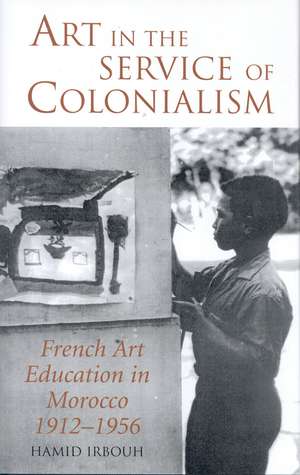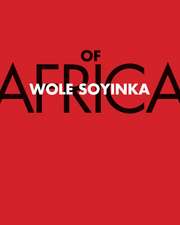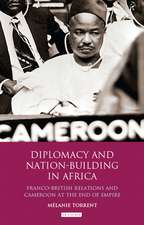Art in the Service of Colonialism: French Art Education in Morocco 1912-1956
Autor Hamid Irbouhen Limba Engleză Hardback – 26 iul 2005
| Toate formatele și edițiile | Preț | Express |
|---|---|---|
| Paperback (1) | 218.18 lei 6-8 săpt. | |
| Bloomsbury Publishing – 24 mar 2013 | 218.18 lei 6-8 săpt. | |
| Hardback (1) | 773.23 lei 6-8 săpt. | |
| Bloomsbury Publishing – 26 iul 2005 | 773.23 lei 6-8 săpt. |
Preț: 773.23 lei
Preț vechi: 1112.59 lei
-31% Nou
Puncte Express: 1160
Preț estimativ în valută:
147.96€ • 154.87$ • 123.15£
147.96€ • 154.87$ • 123.15£
Carte tipărită la comandă
Livrare economică 31 martie-14 aprilie
Preluare comenzi: 021 569.72.76
Specificații
ISBN-13: 9781850438519
ISBN-10: 185043851X
Pagini: 296
Ilustrații: 40 black and white illustrations
Dimensiuni: 138 x 216 x 26 mm
Greutate: 0.49 kg
Ediția:New.
Editura: Bloomsbury Publishing
Colecția I.B.Tauris
Locul publicării:London, United Kingdom
ISBN-10: 185043851X
Pagini: 296
Ilustrații: 40 black and white illustrations
Dimensiuni: 138 x 216 x 26 mm
Greutate: 0.49 kg
Ediția:New.
Editura: Bloomsbury Publishing
Colecția I.B.Tauris
Locul publicării:London, United Kingdom
Notă biografică
Hamid Irbouh received his D.Phil from the Department of History and Theory of Art and Architecture at the State University of New York, Binghamton. He has contributed essays to several books and journals and lives in upstate New York.
Cuprins
Archive Centres and Libraries Mentioned in the TextList of IllustrationsAcnowledgementsIntroductionThe Establishment of French Colonial Hegemony over MoroccoContemporary Moroccan Scholarship on Moroccan Art ProductionFrench Colonial Art Education in MoroccoBook OutlinePart One: Classifications and AssociationsChapter One : Framing Morocco's CraftsChapter Two: Diffusing Colonial OrderPart Two: Design and Process of Colonial EducationChapter Three: Colonial Mass EducationChapter Four: Vocational Schools for Men and the French Infiltration of Morocco's Traditional IndustryChapter Five: Women's Vocational SchoolsPart Three: Originality, Drawing and Colonial ExploitationChapter Six: Vocational Training and Patriotism in FranceChapter Seven: Drawing as an Apparatus of ExploitationChapter Eight: The Open Workshops and the Casablanca School of Fine ArtsBy Way of Conclusion: The Burden of Cultural DecolonisationThe PopulistsThe NativistsThe BipictorialistsNotesBibliography Index











